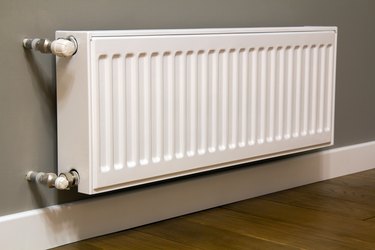
Radiator heat can be an efficient way to keep your home warm. Hot water radiators, steam radiators, and electric baseboard radiators all target their heat toward human comfort. There are some steps you can take to ensure the safety of your radiators and continued operation of your radiator heating system.
Radiator Safety Tips
Video of the Day
If you have hot water radiators, steam heat radiators, or electric baseboard radiator heat, you should have a licensed heating professional inspect your heating system before the onset of heating season each year. If your heating system vents through a chimney, you should also have the chimney cleaned each year.
Video of the Day
Having these cleaned not only prevents dust and debris from building up inside the system but it also prevents the potential buildup of carbon monoxide. Dusting around your radiators every so often during the heating season also keeps the radiators free of possible fire hazards. Pipes leading to hot water or steam radiators should also be insulated to prevent burns if they are touched.
Keep items 3 feet away from steam radiators to prevent anything from catching on fire. Steam radiators are most likely to cause burn or scald wounds. Hot water radiators and electric baseboard radiators usually don't get hot enough to cause burns, but it's still a good idea to keep items at least 6 inches away from the radiator to keep the heating systems working efficiently.
Regular Maintenance Tips
Steam radiator valves should be turned all the way on or off when being used. Partially opening the valve doesn't actually control the radiator. Adjusting a steam radiator valve can also eventually cause it to fall out, which could cause a room to fill with hot steam. Although this is rare, it can suck oxygen out of the room. It's better to have a professional install a thermostatic radiator valve, which will allow you to adjust the temperature of the steam heat.
While steam radiators have valves that may fail, hot water radiators should be bled at the start of each heating season to keep them in good working order. Open each radiator vent with a screwdriver or vent key to catch the water that will drip out. If a steam radiator is working properly, it will bleed automatically.
Electric baseboard radiators, which are much safer than space heaters, work best when controlled from one thermostat in the same room rather than adjusting various units differently. Keep children and pets away from baseboard heaters. Even though they are safer than space heaters, there is still a possibility that they can burn a child or pet who gets too close. Vacuuming the heating units helps control dust and debris buildup.
Other Preventive Measures
Steam radiators are much more likely to be hot to the touch than hot water radiators, and injury is much more likely to occur from the hot radiator than the steam. Radiator covers can solve the problem of hot radiators.
Properly built radiator covers have reflective backs that funnel the heat into the room rather than into the wall. Most radiator covers are made of metal or synthetic materials and have holes that allow the heat to escape. Some direct the heat away from the ceiling and into the room, and this can make the radiator cover more efficient than an uncovered radiator.
Oil-filled electric radiators resemble old-fashioned steam or hot water radiators. They do not leak any fuel, and most are equipped with a sensor that shuts off the heater if it becomes off balance or is knocked over. Still, don't leave flammable materials around the radiator. Also, always plug an oil-filled electric radiator into a wall outlet. Never plug it into an extension cord or power strip.